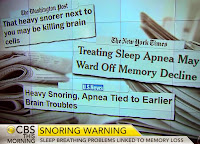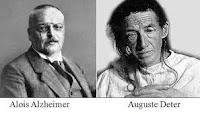VIDEO + ARTICLE:
A new study linked heavy snoring or sleep apnea to early memory loss and Alzheimer’s. However, people treating sleep breathing problems with a continuous positive airway pressure (CPAP) machine pushed off memory loss by 10 years, to age 82 on average, instead of 72. See what a good night’s sleep can do for your brain.
Heavy snoring and sleep apnea may be linked to memory and thinking decline at an earlier age, according to a new study published in the online issue of Neurology®, the medical journal of the American Academy of Neurology. The research also suggests that treating the disorders with a breathing machine may delay the decline.
Continued below video…
“Abnormal breathing patterns during sleep such as heavy snoring and sleep apnea are common in the elderly, affecting about 52 percent of men and 26 percent of women,” said study author Ricardo Osorio, MD, with the NYU Langone Medical Center in New York.
For the study, the medical histories for 2,470 people ages 55 to 90 were reviewed. Participants were categorized as either free of memory and thinking problems, in early stages of mild cognitive impairment (MCI), or with Alzheimer’s disease.
The researchers also looked at people with untreated sleep breathing problems versus those without the sleep breathing problems and also untreated versus treated people with sleep breathing problems.
The study found that people with sleep breathing problems were diagnosed with MCI an average of nearly 10 years earlier than people who did not have sleep breathing problems. For example, when researchers examined only people who developed MCI or Alzheimer’s disease during the study, those with sleep breathing problems developed MCI at an average age of 77, compared to an average age of 90 for those who did not have sleep breathing problems. Among that group, those who had sleep breathing problems also developed Alzheimer’s disease five years earlier than those who did not have sleep breathing problems, at an average age of 83 versus 88.
The researchers found that people who treated their sleep breathing problems with a continuous positive airway pressure (CPAP) machine were diagnosed with MCI about 10 years later than people whose problems were not treated, or at age 82 instead of age 72.
“The age of onset of MCI for people whose breathing problems were treated was almost identical to that of people who did not have any breathing problems at all,” Osorio said. “Given that so many older adults have sleep breathing problems, these results are exciting — we need to examine whether using CPAP could possibly help prevent or delay memory and thinking problems.”
Osorio noted that more research is needed. “These findings were made in an observational study and as such, do not indicate a cause-and-effect relationship,” said Osorio. “However, we are now focusing our research on CPAP treatment and memory and thinking decline over decades, as well as looking specifically at markers of brain cell death and deterioration.”
Sources:
- American Academy of Neurology (AAN)
- CBS This Morning
Reference:
- Ricardo S. Osorio, Tyler Gumb, Elizabeth Pirraglia, Andrew W. Varga, Shou-En Lu, Jason Lim, Margaret E. Wohlleber, Emma L. Ducca, Viachaslau Koushyk, Lidia Glodzik, Lisa Mosconi, Indu Ayappa, David M. Rapoport, Mony J. De Leon. Sleep-disordered breathing advances cognitive decline in the elderly. Neurology, April 2015 DOI: 10.1212/WNL.0000000000001566











